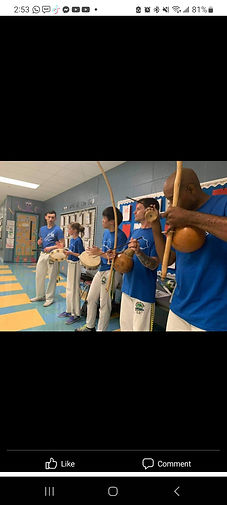
Música
Capoeira music is the traditional musical accompaniment used in Capoeira, featuring instruments like berimbau, pandeiro, atabaque, agogô, and reco-reco. The music plays a crucial role in capoeira roda, setting the style the energy of a game.
Music in the context of capoeira is used to create a sacred space through both the physical act of forming a circle (the roda) and an aural space that is believed to connect to the spirit world. This deeper religious significance exists more as a social memory to most capoeira groups, but is generally understood as evidenced in the use of ngoma drums (the atabaques of Yoruba candomblé), the berimbau whose earlier forms were used in rituals in Africa and the diaspora in speaking with ancestors, the ever-present term axé which signifies life force, the invocation of both Afro-Brazilian and Catholic spirituality, and certain semi-ritualized movements used in Capoeira Angola that bring "spiritual protection".

Volta Por Cima Música
Capoeira Song Book
Below is a link to a compendium of the many Capoeira songs sung around the world with their English translations. Also included is a guide on Brazilian Portuguese pronunciation, a capoeira glossary, an article about religion and its connection to Capoeira and other articles about Capoeira songs.
The aim of this document is to serve as a high-quality resource for English speaking Capoeiristas who wish to deepen their knowledge of these Capoeira songs and the wisdom contained therein and hopefully improving their Portuguese at the same time. Apart from containing just lyrics in Portuguese and English is a section on pronunciation as well as a glossary at the end. There are also sections on the different types of songs and improvisation (taken, with kind permission, from Grupo T.A.B.C.A.T), as well as a section summarizing religious syncretism and its connection to Capoeira.
A debt is due to those who typed and translated these capoeira songs and released them on the net to help budding non-Portuguese speaking Capoeiristas. Songs that have been taken from the net, have been improved on; with reference to grammar errors, unnatural translations and missing cultural and historical references – perhaps the most important thing to help deepen knowledge of Capoeira. In addition, a big thanks to Pirulito, from capoeira4all.com and Instructora Bia, from Grupo Origens do Brasil, Bournemouth for their help with translations and cultural references. Finally, a big thank you to Raposa from Shadowcatcapoeira, who painstakingly edited this document for grammar, spelling as well as plain silly translations! Other non-lyric based acknowledgements are found within the document.
